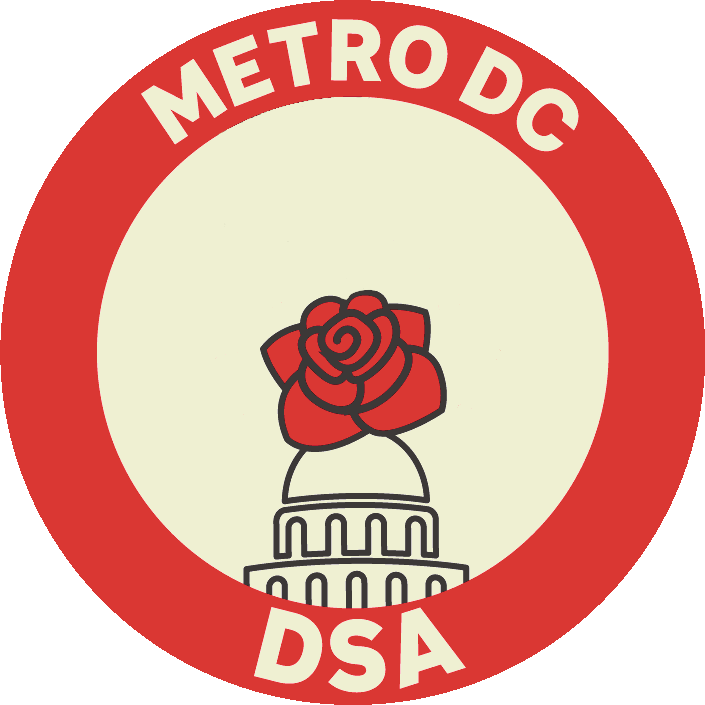

Peninsula DSA Supports Single Inclusive Democratic State for Palestinians and Israelis
Peninsula DSA Supports Single Inclusive Democratic State for Palestinians and Israelis
SAN MATEO, July 16, 2024 - Following the leadership of our comrades in Chicago DSA, Peninsula (CA) DSA voted at our June 2024 General Membership Meeting to declare our support for a political vision of one democratic state in Palestine. We identify Zionism’s politicization of identity and Israel’s nature as a state exclusive to Jews as a root cause of the suffering and injustice which Israel has inflicted upon the people of Palestine, and we believe that true peace and liberation can only be achieved by the dismantling of the apartheid, settler-colonial state and the establishment of one democratic state in its stead.
The material reality is that a two-state solution is not feasible, and it has long been more of an aspirational myth rather than a serious policy proposal. In the words of Jewish Currents contributing editor Joshua Leifer, the idea is little more than a “political fiction” which gives liberal Zionists a way “to reconcile their seemingly contradictory commitments to both ethnonationalism and liberal democracy.” Since the 1970s, when Palestinian intellectuals first proposed a “mini-state” on 22% of historic Palestine, Israel has continuously redefined the conceptual Palestinian state to include ever-less territory and to hold ever-less sovereignty. By the 1980s, there were already 100,000 Jewish settlers in the West Bank, prompting former Jerusalem Deputy Mayor Meron Benvenisti to warn that it was “five minutes to midnight” for the two-state solution. Now, there are over 650,000 settlers in the West Bank, and settlers, emboldened by Israel’s ongoing genocide in Gaza, are committing even more violence and stealing more Palestinian land. The two-state solution—which has come to mean a fragmented Palestine under de facto Israeli control—cannot generate a movement powerful enough to bring liberation to Palestine; it only provides cover for ongoing ethnic cleansing.
For this reason we support a movement for a single, inclusive state between the river and the sea that is:
- Democratic. All citizens would be equal in the eye of the state, including its laws, institutions and policies, regardless of identity. This includes the right of those who have been ethnically cleansed from Palestine to return and enjoy full citizenship.
- Secular. Freedom of worship would be guaranteed, and one’s religion or identity would not be a factor in granting or denying rights to citizens or non-citizens.
- Socially just. Stolen land, homes and property would be restituted to all victims of dispossession. Resources and social welfare would be allotted fairly to all citizens. The income, poverty and education gaps would be bridged.
Finally, we call on national DSA to likewise declare its support of one democratic state in Palestine: a “one-person, one-vote” state in which everyone is represented equally, regardless of ethnicity, religion, origin, etc. As socialists it is our responsibility to imagine what a just world would look like and share that vision with the world. Without democracy, self-determination is impossible, and without full equal rights under a secular state, there can be no democracy for the Palestinian people. Separate can never be equal.
Further reading:
- “What Does ‘From the River to the Sea’ Really Mean?” (2021), Jewish Currents
- “Teshuvah: A Jewish Case for Palestinian Refugee Return” (2021), Jewish Currents
- The Resilient Fiction of a Two-State Solution” (2020), Jewish Currents
- “Yavne: A Jewish Case for Equality in Israel-Palestine” (2020), Jewish Currents
- “The Case for the One Democratic State Initiative as a Counter-Hegemonic Endeavor” (2023), Mondoweiss
- One Democratic State Initiative


New candidates, similar ideologies win out in 2024 NOVA primaries


Pepco tries to hide rate hikes behind climate readiness


Stomp Out Slumlords
The post Stomp Out Slumlords appeared first on Metro DC Democratic Socialists of America.


Labor Working Group
The post Labor Working Group appeared first on Metro DC Democratic Socialists of America.


Electoral Campaign
The post Electoral Campaign appeared first on Metro DC Democratic Socialists of America.


Abolition Campaign
The post Abolition Campaign appeared first on Metro DC Democratic Socialists of America.


Solidarity with the Bangladeshi Student Protestors
YDSA stands in solidarity with the student protesters of Bangladesh who are facing brutal repression and terror from their government. Student protests began at the start of July against a quota reserving much of the civil service to descendants of veterans of the Liberation War. This system unfairly benefits supporters of the Awami League, Bangladesh’s authoritarian ruling party, and contributes to systematic governmental corruption. Through strikes and demonstrations, the students brought their schools and universities to a standstill. In response, the government has struck back with horrific violence. More than a dozen people have been murdered by police and armed supporters of the government with hundreds more injured including children. The government calls for calm while it accuses the students of treason and cuts off internet access. Yet the students of Bangladesh have continued their protests in spite of the regime of repression. As internationalists, the YDSA stands with the struggle of the oppressed worldwide. Across the world, the youth are leading struggles against common systems of exploitation. The students of Bangladesh are an inspiration to us in our united struggles
The post Solidarity with the Bangladeshi Student Protestors appeared first on DSA International Committee.


DSA IC Stands with the Kenyan People against Austerity and Imperialism
DSA International Committee applauds the courage and determination of the Kenyan people in their tireless struggle against the imposition of the now-withdrawn 2024 Finance Bill. Amid fierce state repression, including the murders of as many as 200 protesters by police forces, thousands continue to mobilize, demanding the resignation of President William Ruto.
Protests against the 2024 Finance Bill, which promised to intensify an increasingly dire cost-of-living crisis, have united Kenyans of all ages, genders, and ethnicities. The Communist Party of Kenya describes the situation as, “not merely about an imposed IMF finance bill, [but] a potent manifestation of the deep-seated inequalities that plague Kenya. Millions of our people languish in abject poverty, while a stinking corrupt elite flaunts their ill-gotten wealth with shameless opulence.”
Austerity economics continue to ravage the working poor, unemployed, and landless in cities and rural areas all over the world. When we speak of austerity and neoliberalism, we lay responsibility first and foremost at the feet of the United States, which holds greater institutional power over the international financial system than any other nation on Earth. And it is US imperialism which guarantees, through force and subversion, the conditions necessary to reproduce austerity for billions across the world, generation after generation. Kenya is but the latest site of resistance to the mercenary demands of the US-led capitalist world system.
President Ruto’s government is fighting for its survival on multiple fronts. As Kenyans vehemently reject the draconian proposals of the 2024 Finance Bill, Ruto faces widespread domestic opposition and a substantive legal challenge for contributing more than one thousand police officers to a US-backed invasion of Haiti in service of the imperialist Core Group.
Haiti remains captured, controlled, and terrorized by Western forces, its treatment yielding minimal opposition across the Americas. Nevertheless, Kenyans have refused to sit by idly as they are enlisted as proxies to meet the military objectives of colonial powers and their collaborators in the region.
Kenya’s future belongs to its people. So, too, does the future of humanity depend on the persistent organizing and solidarity of socialists in the United States— a solidarity that must include willing sacrifice. Ours, too, is a struggle against the depravities of capitalism, the violence of imperialism and militarism, and the illegitimacy of anti-democratic rule over the working masses. We gain strength from our comrades in Kenya, and support every effort to advance their struggle and the struggles of all peoples around the world for justice, land, and dignity.
The post DSA IC Stands with the Kenyan People against Austerity and Imperialism appeared first on DSA International Committee.
